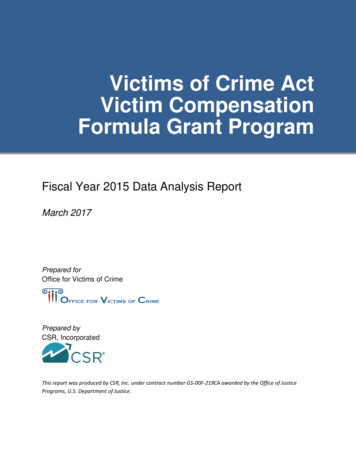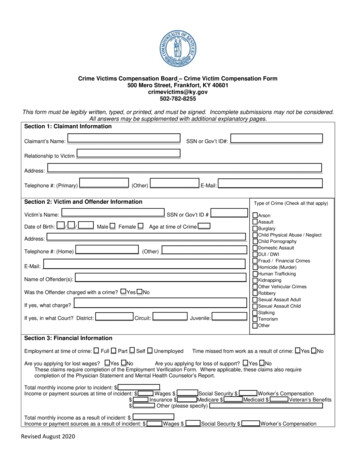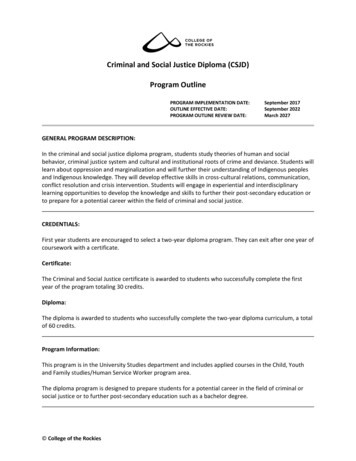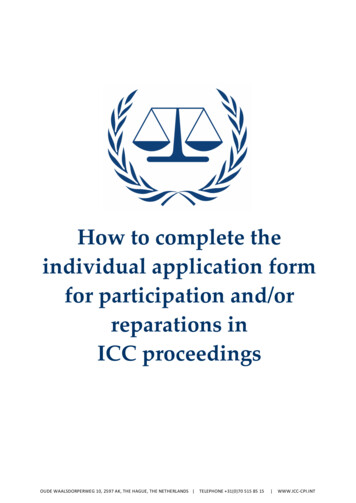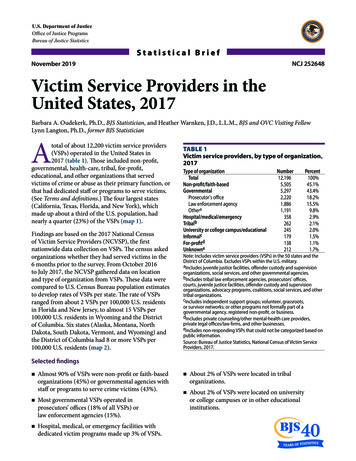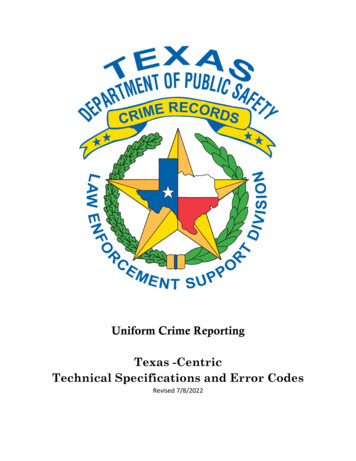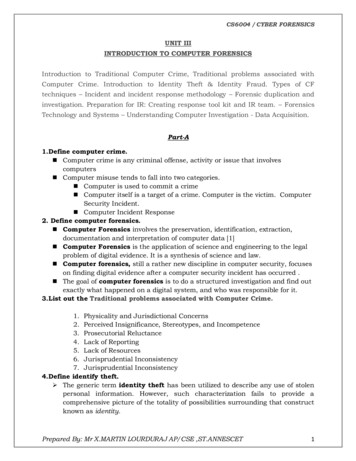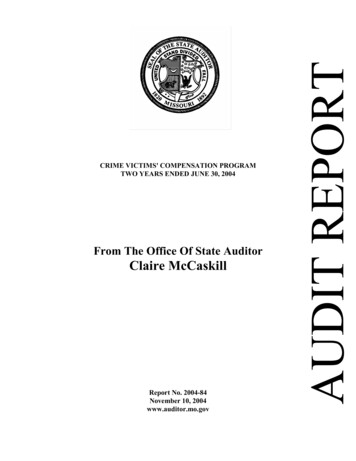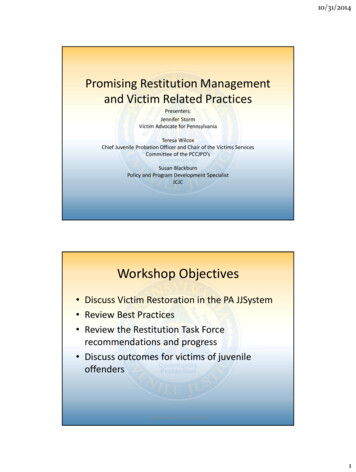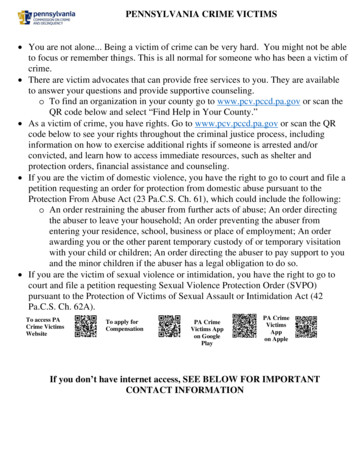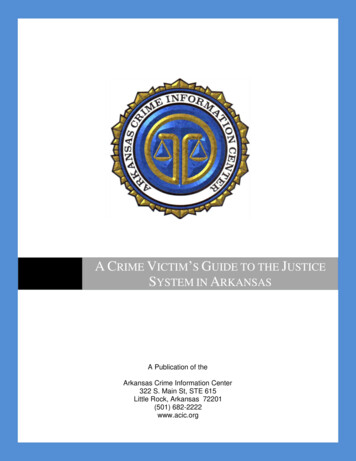
Transcription
A CRIME VICTIM’S GUIDE TO THE JUSTICESYSTEM IN ARKANSASA Publication of theArkansas Crime Information Center322 S. Main St, STE 615Little Rock, Arkansas 72201(501) 682-2222www.acic.org
Crime Victim's GuideA Crime Victim's Guide to the Justice System in Arkansas was written to assist victims of crime inbetter understanding the Arkansas criminal justice system so they are more able to exercise their rights. Itis also designed to inform victims of services available to them throughout the state including shelter,cash assistance, counseling, and private support organizations. This guide is not intended as a legalreference or to provide legal advice, but as an aid to further understanding of the criminal justice systemin Arkansas.ContentsIntroduction .4Components of the Criminal Justice System . 4Law Enforcement .4Prosecution .5Juvenile Justice .5Courts.6Arkansas State Hospital.7Appeal Procedures .7Department of Community Correction .8Department of Correction .9Parole Board .10Crime Victims Rights .11Victim Impact Statements . 13Arkansas Victim Notification Program (VINE) .14Prosecutor-Based Victim Assistance Programs.15Crime Victims Reparations Board.16Arkansas Commission on Child Abuse, Rape, and Domestic Violence (ACCARDV) . 18Arkansas Court Appointed Special Advocate Association (CASA) .19Arkansas Department of Health and Human Services .19Victim Organizations (Non-governmental) .20Arkansas Coalition Against Domestic Violence .20Arkansas Coalition Against Sexual Assault .20ACASA Member Centers . 21-26Family Service Agency .28Family Violence Prevention Fund .282
Mothers Against Drunk Driving . 28National Center for Missing and Exploited Children .29National Center for Victims of Crime . 29National Domestic Violence Hotline . 30Northwest Arkansas Crisis Intervention Center . 30Parents Of Murdered Children . 31Arkansas Escape Alert System . 32Arkansas Sex Offender Alert Service . 32Glossary of Terms . 333
A Crime Victim's Guideto the Justice System in ArkansasIntroductionThis guide provides an overview of the criminal justice system in Arkansas. It is intended to assist victimsof crime in understanding the functions and responsibilities of criminal justice agencies.Another purpose of this guide is to inform crime victims of the various services that may be available tothem. Arkansas offers a wide range of services, such as shelter, cash assistance, and counseling. Theorganizations that provide assistance to crime victims are listed, along with a brief description of each.This guide was produced by the Arkansas Crime Information Center. Although the material contained inthis publication is believed to be accurate, readers should not rely exclusively on its contents. This guideis not intended as a legal reference and no warranty, expressed or implied, is made. It is not intended aslegal advice or as a substitute for legal research.Components of the Criminal Justice SystemLaw EnforcementWhen a crime occurs, law enforcement officers are normally the first to respond. These officers may needto provide protection and assistance to persons with physical injuries and/or emotional trauma.Emergency services, such as ambulances and fire department response teams, may be required.Depending on the size of the law enforcement agency, the first officer on the scene may not be theindividual who completes the investigation. After the initial report is taken, a detective, or another officerwith specialized skills, may be assigned to the case. Jurisdiction regarding law enforcement agencies'responsibilities, as they relate to a particular crime, can vary.Once the emergency needs of persons at the scene are met, officers then begin collecting evidence.From the beginning, it is critically important to preserve and safeguard evidence. Therefore, officers maybe required to prohibit public access. Many times property must be removed from the crime scene andtaken to the crime lab for processing. Families of crime victims will be kept away from the scene untilevidence is secured. In order to collect and document evidence of the crime, officers may ask manyquestions of the victim, family members, neighbors, witnesses, and potential witnesses. Theseconversations are often audio taped or videotaped. This seemingly intrusive technique can preventunnecessary, repetitive interviews of the witnesses. Follow-up investigations can be conducted days,weeks, months, and even years after the initial investigation. Officers may need to revisit the crime sceneand talk to victims and witnesses previously interviewed.When a law enforcement agency makes an arrest, the arrested person may or may not be immediatelyjailed. In less serious crimes, an offender may only be issued a citation ordering that they appear in courton a certain date. In cases involving more serious crimes, a court hearing is necessary to decide whetherthe offender should be released pending trial, resulting in a bond or bail being posted and a release fromcustody, perhaps hours after the arrest.4
Law enforcement's role does not end with the arrest of the alleged offender. Working closely withprosecuting attorneys, law enforcement officers frequently testify at trials. Officers testify on the contentsof the police report, evidence collected at the scene, and how the evidence was preserved forpresentation in court. Some law enforcement agencies in Arkansas also operate victim assistanceprograms within their departments. Specialized victim assistance coordinators provide a wide range ofservices to victims of crime. These services are discussed in the "Victim Services" section of this Guide.ProsecutionIn Arkansas, the prosecuting attorney is responsible for making the decision to charge a person withcommitting a crime based on the investigative information provided by law enforcement. Most crimes inArkansas are defined by the Arkansas Criminal Code. It is vital to understand that criminal cases arebrought by the State, not the victim of the crime. The prosecutor has the sole authority to bring chargesand they can be brought contrary to the victim's wishes. If the prosecutor decides to pursue the case, adocument called an "information" is filed with the court. One of the first appearances by a defendant incourt is often referred to as "plea and arraignment."At the hearing, the defendant is asked whether he or she will enter a plea of guilty, not guilty, or nolocontendere (no contest). If the defendant pleads guilty or no contest, he or she will then be sentenced bythe judge. A no contest plea has the same effect as a plea of guilty as far as the criminal sentence isconcerned. If the defendant pleads not guilty, a trial date is set. The court also considers the amount ofbail and other conditions of release, which permit the defendant to be out of jail until the trial. In Arkansas,every defendant is eligible for bail. Judges, however, are not required to set bail for defendants chargedwith capital murder where specific circumstances exist.The trial may be avoided if the defendant and the prosecutor agree to a negotiated plea. Agreementssuch as these save time, stress, and money. Also, taking a case to trial is always uncertain; there is noguarantee of a conviction at trial. It is important to recognize that a guilty plea is a conviction.Juvenile JusticeArkansas has a separate court division for children who commit criminal acts. In the juvenile justicesystem, focus is placed on rehabilitation of the juvenile offender and victim restitution. The commission ofsome crimes, however, can expose a person age 14 or older to prosecution as an adult in circuit court. Ifa person under the age of 18 is tried in circuit court, he or she is considered as an adult, and juvenilecourt procedures do not apply.When a prosecutor believes a juvenile has committed a crime, he or she may choose to file a"delinquency petition". The delinquency petition summons the juvenile to an "adjudication hearing". If theallegations in a petition are found to be true, a juvenile is "adjudicated delinquent". If he or she is to beincarcerated before or after the hearing, the child is placed in "juvenile detention" or "transferred into theDivision of Youth Services' custody". These children who commit acts that would be criminal if committedby an adult are referred to as juvenile delinquents. Under Arkansas' juvenile code, a delinquent juvenile isdefined as a person age 10 through age 17.If a juvenile is an adjudicated delinquent, there are several disposition alternatives available to the judge.The judge may require the juvenile to undergo counseling, place the juvenile on probation, or require himor her to perform community service. Other available options are the C-Step Program, detention, and5
transfer into the custody of the Division of Youth Services. The judge will decide the appropriatealternative.It is also important to note that juvenile delinquency proceedings usually are more private than adultcriminal trials. Juvenile court records are not public records and are not subject to release under theFreedom of Information Act. The court proceedings and filings may also be closed and confidential. Acrime victim and persons providing victim support, or a victim's representative, may be present unless thejudge decides that that person's exclusion is necessary to preserve the confidentiality or fairness of ajuvenile proceeding. Crime victims do not have the right to present victim impact statements, but somejudges may allow them. Information regarding juveniles is not available through the Arkansas VINEProgram unless the juvenile is charged as an adult.CourtsUnder current law, there are four basic types of courts in Arkansas with authority to hear criminal cases.District courts hear misdemeanor cases, while Circuit courts can hear both misdemeanor and felonycases. The Arkansas Court of Appeals and the Arkansas Supreme Court have jurisdiction to hear criminalappeals.Under Arkansas law, defendants are entitled to a jury trial for criminal cases. The defendant, however,can waive his or her right to a jury trial. When the defendant waives the right to a jury trial, the judge alonedecides whether the defendant is guilty and determines the punishment. The trial court judge is animpartial official who along with the jury hears the case. Based on the law, the judge decides whatevidence can be presented to the jury. The judge also instructs the jury at the end of the presentation ofevidence on how the jury should apply the law to the facts.Arkansas law requires that defendants have the opportunity to be represented by an attorney. If thedefendant cannot afford to pay for an attorney, the court will appoint an attorney or public defender torepresent the defendant. The defendant can, however, waive the right to an attorney and choose torepresent himself or herself in the case. The defendant is not required to present any evidence at all,since he or she is innocent until proven guilty by the prosecution. The defense attorney may believe theprosecution has failed in proving its case and that it is not necessary to present his client's defense.Arkansas law provides for twelve members of the community to hear the case. When the trial begins, allthe witnesses scheduled to testify in the case are removed from the courtroom until they are called totestify. This is so they will not hear other witnesses' testimony and be influenced. Whenever possible,separate waiting areas are provided for prosecution and defense witnesses. In order for the defendant tobe convicted at trial, the prosecutor must prove beyond a reasonable doubt that the defendant committedthe crime charged. The members of the jury hear the evidence and decide the defendant's guilt orinnocence. The verdict must be unanimous in a jury trial.Arkansas uses a "bifurcated" trial system. This means that the "guilt" phase is separate from thesentencing phase. After the "guilt phase" of the trial has ended, the jury will also decide the defendant'spunishment. Generally, the jury is allowed to return only one of two verdicts: guilty or not guilty. If theverdict is "not guilty," the defendant is released. If the verdict is "guilty", the court formally enters ajudgment of conviction. Then, the sentencing phase of the trial begins. The sentencing phase is almostlike another trial. Evidence of aggravating and mitigating circumstances that may not have been allowedduring the guilt phase is now introduced.For additional definitions of legal terms used in the courtroom, refer to the Glossary section of this guide.6
Arkansas State HospitalAn individual charged with a felony crime may be ordered by the court to receive an evaluation at theState Hospital on his or her competency and responsibility. Deciding competency consists of evaluatingwhether the defendant currently understands the proceedings in which he or she is involved, is aware ofwhat is going on around him or her, and is able to assist his or her attorney in preparing the defense.When evaluating the responsibility of the defendant, the question is whether the defendant, at the time ofthe alleged crime, could have refrained, by reason of his or her mental state, from committing the actioncharged. The evaluation also considers whether the defendant was aware, at the time of the allegedcrime, that his or her action was wrong or illegal.If found "not competent," the defendant will be ordered to the State Hospital for treatment where the goalis to restore the competency of the defendant. This treatment may last up to ten months. If found "notresponsible", the defendant is committed to the State Hospital for up to 30 days. This means that thedefendant has been acquitted of the charges due to "mental disease or defect". The person is committedto the State Hospital to determine if he or she presents a danger to himself or herself or the person orproperty of others.Once it is determined that the individual no longer presents a danger and is ready for discharge from theState Hospital, the treatment team works with various community providers to locate an appropriateplacement and aftercare plan for the individual. A plan is prepared and submitted to the Probate Court,and a hearing is scheduled. If the judge approves the plan, the individual will be discharged from theState Hospital into an approved setting.Arkansas State Hospital4313 West MarkhamLittle Rock, AR 72205501-686-9032Appeal ProceduresWhen a defendant has been convicted of a criminal offense in Arkansas, he or she may file an appealwithin thirty days with the Arkansas Supreme Court or the Arkansas Court of Appeals. The rules of theSupreme Court contain guidelines for determining in which court a particular appeal must be filed. Adefendant convicted in a District Court may appeal to the Circuit Court.The Attorney General's Office represents the State in the two appellate courts. The record of the trial,including all of the papers filed in the trial court, the exhibits presented at trial, and the written transcript ofall trial testimony, is compiled and filed in the appropriate appellate court. The defendant, now referred toas the appellant, then files a brief, in which he or she argues that errors occurred during the trial and thathis or her conviction and/or sentence should be reversed. The Attorney General's Office then files theState's (appellee's) brief responding to the claims (or grounds of error) made in the appellant's brief.The case will be submitted to the appellate court for consideration and a decision. In some cases, theappellate court will hear oral arguments from the attorneys who prepared the briefs. After considering thecase, the court will announce its decision in a written opinion. The court may affirm, or uphold, theconviction and sentence; reverse, or overturn, the conviction and/or sentence; or, in some instances,affirm some part of a conviction or sentence and reverse other parts of it. Depending on the nature of theerror, a case that is reversed may either be dismissed entirely or be remanded to the trial court for further7
proceedings, perhaps including a new trial. When a case is remanded to the trial court, the prosecutingattorney's office will represent the State in the new proceedings there. Finally, defendants can ask theUnited States Supreme Court to consider claims of constitutional error in their cases.After the appeals process described is completed, defendants may seek what is called collateral or postconviction relief in both state and federal court. Ordinarily, defendants begin seeking this type of relief instate court. In Arkansas, the relevant procedural law is contained in a court rule known as Rule 37. Rule37 cases begin in the circuit courts where the criminal trial took place. Most often defendants challengethe effectiveness of their trial lawyers in these proceedings. A circuit court's decision to grant or denyrelief is appealable to the Arkansas Supreme Court and reviewable in the United States Supreme Court.If state post-conviction relief efforts fail, defendants can seek relief in federal district court by filing apetition for habeas corpus. The grant or denial of that relief is appealable to a federal intermediateappellate court and subject to being reviewed in the United States Supreme Court. State law alsoprovides other potential avenues for relief by various petitions for extraordinary relief that may be filed inboth the state trial courts and the Arkansas Supreme CourtOffice of the Arkansas Attorney General323 Center Street, Suite 200Little Rock, AR 72201501-682-2007www.arkansasag.govDepartment of Community CorrectionWith a rapidly increasing number of individuals being committed to the state penitentiary, the ArkansasDepartment of Community Correction (DCC) was established as an alternative to prison. DCC operatescommunity-based correctional centers, the Technical Violator Program, and administers the statewideprobation and parole programs.Community-based correctional centers are currently located in Little Rock, Texarkana, Osceola, Pine Bluffand Fayetteville and provide a balance between "punishment" and a program to help offenders becomelaw-abiding members of society. These centers offer classes in substance abuse education, sobriety,relapse prevention, parenting, domestic violence, self-esteem, anger management, and a variety ofemployment skills.The Technical Violator Program (TVP) provides an alternative punishment for offenders who committechnical parole violations. The TVP provides approximately 60 to 90 days of residential confinementfollowed by 12 months of applied programming in a community setting. The resident will work with acounselor to identify factors contributing to his/her parole violations and develop strategies for achievingand maintaining compliance.The other major responsibility of DCC is the operation of probation and parole offices across the state.These offices supervise adult offenders that have been placed on probation, as well as those offendersthat have been released from the state penitentiary.Probation occurs when a judge sentences an individual without sending them to prison and instead placesthe offender under the supervision of a probation officer. This normally includes conditions such aspayment of restitution, remaining drug-free, being drug tested, gaining and retaining employment,reporting regularly to an officer, etc.8
Parole occurs when an offender has served a portion of his or her sentence in the state penitentiary andis released early, under the supervision of a parole officer, to serve the remainder of that sentence.Department of Community CorrectionTwo Union National Plaza105 West CapitolLittle Rock, AR ment of CorrectionThe Arkansas Department of Correction (ADC) administers the adult correctional facilities in Arkansas.ADC operates a number of adult correctional facilities, including one Boot Camp and four Work ReleaseCenters. The ADC does not determine who is sent to prison or how long they serve. The length of anoffender's sentence and the amount of time actually served are determined by Arkansas laws and thecourts.Once an offender is transferred into the custody of the ADC, an initial processing called intake isconducted. The inmate receives physical, psychological, and academic examinations and is medicallyand mentally classified. Intake of male offenders is conducted at the Diagnostic Unit in Pine Bluff butintake of female offenders occurs at the McPherson Unit in Newport.Inmates are then transferred to a "parent unit" for their initial work assignment, which usually consists ofat least 60 days on a hoe squad. After the initial assignment is completed, a Unit ClassificationCommittee or Officer will assign each inmate to a job based on institutional needs, security level, jobskills, and medical capabilities. All inmates who are medically able are expected to work.Many inmates may reduce the length of their incarceration as a result of good behavior, work habits,program completion, and overall adjustment. This reduction in time served is known as "Good Time".Those sentenced to life without parole or death are ineligible for "Good Time". In addition, some inmatescannot earn "Good Time" until a certain percentage of their sentence has been served.In certain circumstances a furlough may be granted permitting an inmate to leave the unit to visit with hisor her family. This can be either an emergency furlough in cases of serious illness and/or death of aninmate's family member, or a meritorious furlough granted because of good conduct. Inmates convicted ofcapital murder, sexual offenses, stalking, or kidnapping are ineligible for meritorious furloughs.The ADC also allows eligible inmates to participate in a Work Release Program in which inmates arehoused in correctional facilities and hold paying jobs in the community. From the wages they earn, WorkRelease inmates partially reimburse the state for their care and custody.Other programs within the Department of Correction include the Act 309 program and the Boot Campprogram. Under the Act 309 program, inmates are housed in approved city or county jails for workpurposes. The Boot Camp program is a 105-day military style camp for first time, non-violent inmateswhose sentence length is not more than ten years.Inmates may also apply for transfer to another state's prison system to complete their sentence. TheState of Arkansas is a member of the Interstate Transfer Compact, which allows for inmates, undercertain circumstances, to apply for transfer to a correctional facility located in another state. The state to9
which the inmate wishes to be transferred must also be a member of the Interstate Transfer Compact andmust be willing to accept custody of the inmate.For victim assistance, notification, and information contact the Arkansas Department of Correction'sVictim Coordinator's Office at (870) 267-6999. This office serves as the point of contact for victims ofcrime who have any questions about inmates in the Department of Correction. Information about aninmate's status also can be obtained through the department's website or by registering with the VINEprogram.Arkansas Department of CorrectionP.O. Box 8707Pine Bluff, AR 71611(870) 267-6677www.state.ar.us/doc/Parole BoardThe Arkansas Parole Board consists of seven members appointed by the Governor. The Board is requiredto consider an inmate's eligibility for parole, transfer, pardon, and executive clemency. According toArkansas law the Board has the power to determine which eligible inmates will be released and toestablish conditions of release.Prior to an offender's consideration, the Board solicits comments from the victim or the victim's familywhen the following criteria are met:The crime committed was a Class Y, A, or B felony offense, manslaughter, or any violent or sexualoffense,The crime involved death, personal injury, or the threat of personal injury or death,The victim, or the victim's family, has requested in writing or via phone call to be notified.The inmate has been scheduled for a hearing.A victim, or the victim's family, who wants to participate in the parole decision have two responsibilities:(1) to notify the Board, in writing, of their intention to provide input, and (2) to provide a correct andcurrent mailing address to ADC and VINE. In cases involving a transfer date, comments by the victim, orhis or her family, will be limited to the establishment of conditions of parole.The Board also solicits comments from the sentencing court, the prosecuting attorney, and the sheriff ofthe county where the crime was committed when considering an inmate for release or transfer. Inaddition, the Board considers pre-release reports prepared by the Department of Community Correction,as well as risk assessment evaluations prepared by the Department of Correction. The Board alsoconsiders other available information regarding the inmate, the circumstances of the crime, and therelease plan.If the Board denies an inmate's request for parole or transfer, he or she may request a ReconsiderationHearing. Such hearings require the Board to make the same notifications as required for parole ortransfer hearings. Only one reconsideration request is allowed for a particular Board action.10
All pardon and executive clemency recommendations made by the Board must be forwarded to theGovernor for a final decision. Executive clemency may reduce an inmate's sentence length. TheGovernor has complete discretion in pardon or executive clemency decisions and is the only person whocan grant a pardon to restore rights lost as a result of criminal conviction or grant a commutation.Arkansas Parole Board105 W. Capitol Ave. Suite 500Little Rock, AR 72201501-682-3850Victims of CrimeCrime Victims RightsThe Arkansas Crime Victim Rights Law became effective on January 1, 1998. This law mandates certainbasic rights for people victimized by crime. The law does not apply to all crimes, but only certain crimesand certain victims, including:a victim who is a minora victim of a sex offensea victim of any felony resulting in physical injury to the victima victim of any felony involving the use of a deadly weapon avictim of terroristic threatening in the first degreea victim of stalkingIf the victim is a minor, incapacitated, or deceased, a member of the victim's family may exercise therights of the victim.Victim Information - The Crime Victim Rights Law protects information about victims. A court cannotcompel a victim to give his or her address or place of employment in open court, except when the courtdecides it is essential to the case. Law enforcement agencies cannot disclose information to the publicabout the identity of the victim of a sex crime except under limited circumstances. The address andtelephone number of the victim i
Juvenile Justice Arkansas has a separate court division for children who commit criminal acts. In the juvenile justice system, focus is placed on rehabilitation of the juvenile offender and victim restitution. The commission of some crimes, however, can expose a person age 14 or older to prosecution as an adult in circuit court. If
